This section is for paid subscribers only. Our subscription is only $3700/- for one full year.
You get unlimited access to all paid section and features on the website with this subscription.
Subscribe to read full article
This section is for paid subscribers only. Our subscription is only $37/- for one full year.
You get unlimited access to all paid section and features on the website with this subscription.
Not ready for a full subscription?
You can access this article for $2, and have it saved to your account for one year.
- Release Date1961
- GenreDrama
- FormatB-W
- LanguageHindi
- Run Time140 min
- Length4312.92 metres
- Number of Reels16
- Gauge35mm
- Censor RatingU
- Censor Certificate Number35193
- Shooting LocationShri Sound Studio, Dadar, Bombay
Ashok, having lost his entire family during the partition days, had come to Udaipur to work in a firm called the New Era Tractor Co, where his Boss was his old friend. To get accommodation in a respectable locality, Ashok had to pretend as a married man; and the owner of the house, a young widow (Hari Devi) believed him, when he told her that he was expecting the arrival of his wife and children, who may reach Udaipur any moment.
Ashok felt that Hari Devi was very stern and seemed hitter at any thing that was gay or amusing. Ashok tried to understand her bitterness and soon he felt that she was like a little child, from whom a toy had been snatched and so she flung her anger and resentment at any one who was playful and any body who wore a smile. Ashok, on the other hand, who had lost a dozen dear ones, knew that every thing happened as God planned it and so quietly moved along the line of fate. Even when he stumbled, he smiled, for he knew that he was like a lonlely puppet, and unseen hands pulled the strings. One day he had an argument with Hari Devi and revealed as he retorted "Madame, you are bitter because you have lost a support, but what about me whose entire foundation is shattered, and still I neither curse nor complain......... Destiny leads. Who are we to grumble." Ashok's words entered hari Devi's heart like a streak of light entering a dark and dingy place that had yearned for sunshine and warmth. The truth that Ashok had no one in this world, made Hari Devi unexpectedly sympathetic and she begged him not to leave. Now just when Hari Devi had lifted her face up to feel the warmth of the gleam of sunshine, the heavens sent down a burst of rain to wash away the newly born smile. The message came from her mother-in-law to, either drive away the young man from their place or leave Udaipur for Ajmer. Hari Devi quietly left Udaipur for Ajmer.
On one of his business tours, Ashok chanced to meet Manorama. Manorama, a naughty young girl, who along with her younger brother Bhulva danced and sang in the Mela to earn her living. Now Manorama was another child whom Destiny for fun had shown through the "Peep-show" only the ugly side of life. This orphan had learned to suspect, learned to steal and snatch with a rare skill. One of her errands, Manorama was about to fall in the clutches of the law, when Ashok saved her and scolded her for her pranks. They met. They parted. But in Ashok's mind lingered on the innocence, the loveliness and the naughtiness of Manorama.
Days late Destiny took a dramatic turn. Manorama stole somebody's chicken and hid in a house that happened to be the residence of Ashok. Ashok again saved her and Ashok again warned her for her risky pranks and the dangerous consequences. What else could she do! she sobbed. And Ashok offered a solution, to her problem. She could do the house-hold work, get a regular salary for her and her brother and in her spare time learn to read and write, and with a little effort change her habits and be a real lady some day. Manorama at once took the job. The brother and sister brought life and laughter to the new surroundings.
Slowly Ashok and Manorama were being pulled towards each other, like puppets by some unseen string, thought Manorama occasionally jerked at the string and tried to toss away.
Ashok's Boss and Ashok's friend Shri Pyarelal had only one weakness, and that was "girls". When Shri Pyarelal saw Manorama, he at once tempted her with gold, glamour and glory. He used those magic words, tht had always won him a woman. It was a part of his clever scheme to send Ashok out of Udaipur and that too oftener. While Ashok was away on duty, words were shispered to Manorama, underlying a name called Hari Devi. Manorama was furious, Manoorma was foolish and she walked in to his trap. He took her home, gave her glittering clothes and offered her a sweet drink, which to Manorama's ignorance contained some sort of dope. Ashok had left home that morning to undertake his journey to Calcutta, but a sudden atttack of fever, brought him back. When he found that Manorama was missing, he, along with Bhulva searched her here there and everywhere. He was sick and tired, but he could not rest without finding her. At last, late at night he found Manorama, in high spirits astride a flying horse of a merry-go-round and what is more she was in the company of Shri Pyarelal. Ashok was shocked, his poor heart bled and his voice was choaked. He summoned his courage. He tried to shelter Manorama but the third mand intervened and challenged Ashok's manhood. A fight ensued, an though a victor, Ashok was vanquished, as his own Manoram sided the bigger man. She, under the influence of the dirty drug, swore and screemed at Ashok and insulted him publically amusing her audience with a melodramatic performance. The true lover's heart was smitten and he felt like a wounded animal left alone to lick his own wounds. Every Jeer, every laughter seemed like sharp claws ripping him apart.
His fever and his defeat invited serious troubles. Ashok developed Pneumonia, but Pneumonia did not seem to kill him so much, as the memory of the lost love. He looked at the sky and in tht up-turned cup, thousand reflections of Manoram appeared and he thought he would make the empty cup brimful with his tears.
Night seemed to grind on and in its drone Ashok's last fading breaths vanished into the infinite.
Morning brought Manorama he senses. She woke from the night-mare and rushed back to her love, to ask his forgiveness like old times. But this time it was too late. Before morning slid his door-way, Ashok had already been kidnapped by Death, that sneeked in and out without anybody's knowledge. Hari Devi who had just returned from Ajmer, with the news that Ashok was celebrating his wedding, was dumb founded to see the gay young man silenced by the eternal sleep. Cry as she may, who could hear now Manorama's wailing. She dashed her fore-head she broke her bangles, she thought she was unmarried widow.
Thus one puppet (Manorama) that played the truent went her way to sing and dance alone, while the other puppet (Hari Devi) was a silent spectator to this life's cruel drama of which she thought, she was one of the players and also the audience.
(From the official press bookelt)
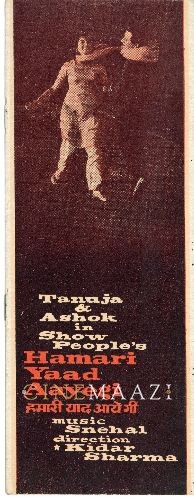
Cast
-
Tanuja
Manorama -
Anant Kumar
Shri Payere Lal- Boss -
Ashok Sharma
Ashok -
Madhavi
Hari Devi -
R Dube
Manorama's younger brother -
Sujata
Pyare Lal's Secretary
Crew
-
BannerShow People, Bombay
-
Director
-
Music Director
-
Lyricist
-
Story Writer
-
Cinematography
-
Editing
-
Sound Recording/ Audiography
-
Art Director/Production Design
-
Costumes
-
Make-up
-
Laboratory/ Processed atBombay Film Labs P. Ltd.
-
Music CompanyH M V






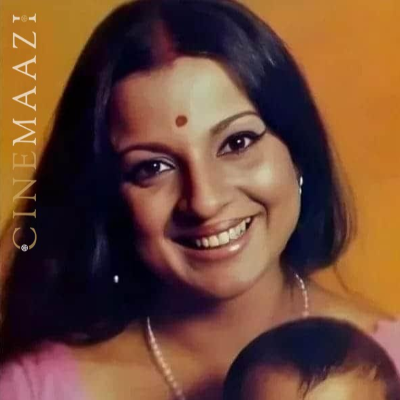

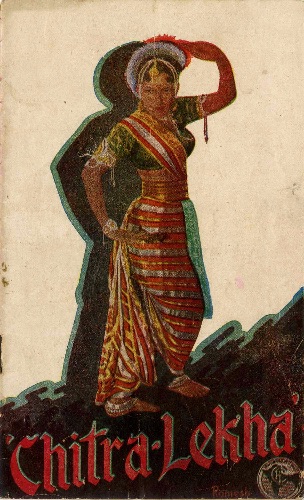
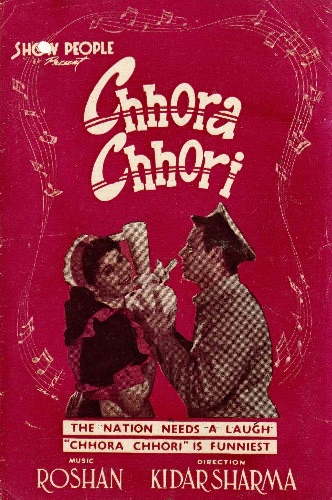
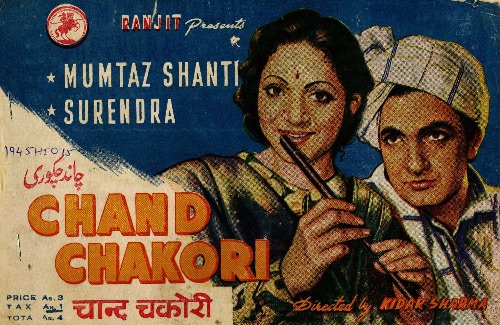

.jpg)



